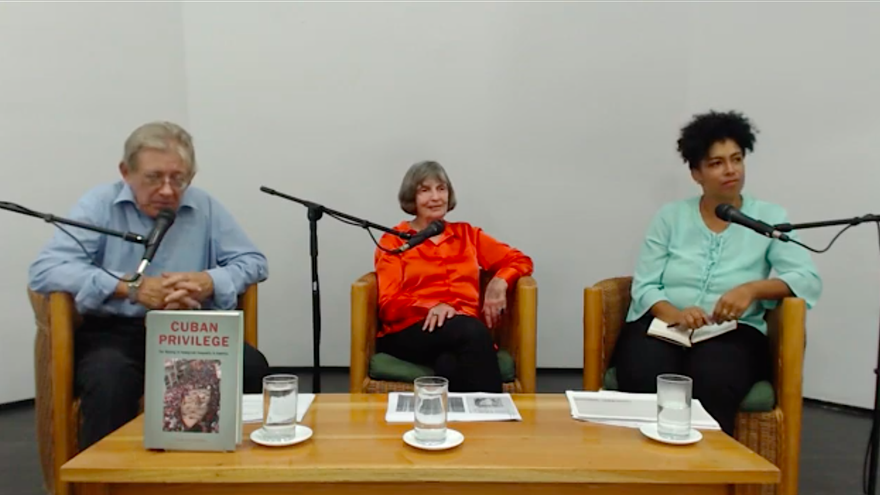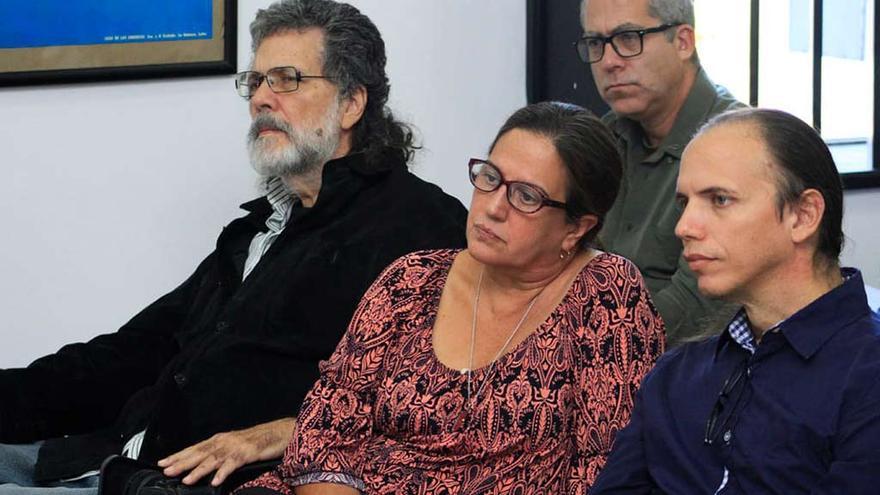
![]() 14ymedio, Havana, 9 December 2023 — “It is a pleasure not to be in a hostile environment, unlike Miami,” American professor Susan Eckstein said this Friday at Casa de las Américas in Havana, amid laughter and the complicity of the public. The author of Cuban Privilege (Cambridge University Press, 2022), a controversial study on the immigration facilities granted to Cubans in the United States, the academic recalled that she was an old friend of Havana.
14ymedio, Havana, 9 December 2023 — “It is a pleasure not to be in a hostile environment, unlike Miami,” American professor Susan Eckstein said this Friday at Casa de las Américas in Havana, amid laughter and the complicity of the public. The author of Cuban Privilege (Cambridge University Press, 2022), a controversial study on the immigration facilities granted to Cubans in the United States, the academic recalled that she was an old friend of Havana.
Eckstein, her hosts celebrated, has developed a “systematic work” to promote “the Cuban Revolution and its impact within the United States,” although – they clarified – always “from her position as an academic in Boston.” Her book has attracted “a lot of attention” from exile, they added, prompting laughter from those present at the allusion to Miami, where a tense presentation of the volume was organized last year.
The professor is not a stranger to “la Casa,” where she was for the first time in the 1970s, she said. “You may know the image on the cover of the book,” said the academic, showing a huge raft dragged by a crowd of Cubans during the so-called Maleconazo of 1994. The photo, which reminded emigrants from Miami of the painful journey between one shore and another, fleeing the desperation of the Special Period, was Eckstein’s starting point to criticize US immigration policies.
Why does Washington allow Cubans to enter and settle in US territory? Because, according to Eckstein, they are “white,” “many” and “millionaires”
Why does Washington allow Cubans to enter and settle in US territory? Because, according to Eckstein, they are “white” – unlike Haitians, she noted – they are “many” – 2.3 million, the majority of whom are in Florida, “the most suitable state to stay in,” she mocked – and they are “millionaires” (several large Florida fortunes belong to Cuban-Americans). To facilitate this entry, the authorities have offered “unprecedented benefits,” the latest of which is the parole program promoted by the Joe Biden Administration.
Washington, the professor added, has always wanted to “overthrow the Cuban Revolution,” and one of the strategies has been to “attract the upper class” and professionals, to strip the regime of human capital. Once in the United States, the objective has been to “train” Cubans for a future state “post-Castro and friendly to the United States.” Presidents Barack Obama and Biden have tried to “suspend” the privileges, but the influence of the exile community in Florida is too strong and, ultimately, they have only managed to “purify” the flow: the only people who migrate are those whose relatives in Florida have money.
Eckstein successfully avoided the elephant in the room: if Cuba is such an advanced country in social security, health, and education, why do its inhabitants leave? The explanations that the academic gave are not the same as the ones she offered in Miami, but they went down better with the public. Cubans leave the country due to the “contagion effect”: if a person decides to emigrate, it is logical that his neighbors will have an urgent desire to leave as well.

It is true, she admitted, that many Cubans are disappointed in their Government, but that, in an “open society” like Cuba, is not decisive, she insisted. She blamed, curiously, an ally of the Havana regime, Nicaragua, for implementing visa-free status for Cubans and facilitating the work of migrant “smugglers.”
Although Eckstein was interested in commenting on the main ideas of her book, she saved the best for last: a photograph of the presentation of Cuban Privilege in Miami, on 9 December 2022. The displeased faces of the public, in a Florida International University auditorium, were the best counterpart to the enthusiastic Casa de las Américas audience. “I thought you would enjoy seeing it,” she said. “There I was attacked by the Cuban-American community.”
Eckstein emerged successfully from a round of questions and answers that did not cause her in any trouble. The public, however, was not up to the task: without bookstores or online shopping platforms, few people in the country have been able to purchase the book. One of the few people on the Island who has a copy is President Miguel Díaz-Canel, who was careful to display the book on his desk a few days after its presentation in Miami.
The academic concluded by defining Florida as a hindrance to implementing any radical immigration policy, criticizing – it could not be missed – the embargo and was grateful for being able to feel “at Home.” In an audience made up of stalwarts of the regime, such as the former Minister of Culture Abel Prieto, current president of the Casa de las Américas, and the Spanish journalist Ana Hurtado, it could not be otherwise.
____________
COLLABORATE WITH OUR WORK: The 14ymedio team is committed to practicing serious journalism that reflects Cuba’s reality in all its depth. Thank you for joining us on this long journey. We invite you to continue supporting us by becoming a member of 14ymedio now. Together we can continue transforming journalism in Cuba.
